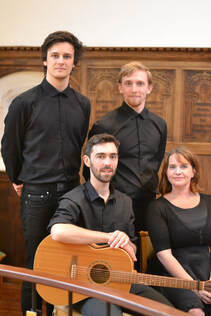|
A Fruitful Season: Keats in Winchester’ by Cecily O’Neill. Directed by Rachel O’Neill. Original Music by Rob Sword. St Lawrence’s Church, Winchester, 6-7 July 2019.  In the popular imagination, John Keats’s stay in Winchester in August and September of 1819 was a touristy sojourn, involving long walks along the picturesque water meadows that stretch either side of the River Itchen down to the medieval hospital of St Cross, and culminating in the composition of ‘To Autumn’. In reality, Keats was in the middle of a last-ditch effort to make money from his pen, conscious of the fact that without significant improvement in his finances, he could not marry his fiancée Fanny Brawne. Earlier in July, Keats had left London with Brown for the Isle of Wight, where they worked together in Shanklin on a tragedy, Otho the Great, intended to showcase the talents of the greatest tragic actor of the age, Edmund Kean. Shanklin had soon begun to grate on Keats, however, and he missed a ‘tolerable library’. After a few weeks, with new hope, he and Brown decamped to Winchester. What is drawn out so powerfully by Cecily O’Neill’s splendid play for 2TimeTheatre about Keats’s stay in the market city, ‘A Fruitful Season: Keats in Winchester’, directed by Rachel O’Neill and introduced by Professor Chris Mulvey, is the sense of desperation that quickly began to settle on the poet as Summer drifted into early Autumn. News arrived that Kean was unavailable, dashing Keats’s hopes of a lucrative Drury Lane success. The poet was left pinning his hopes on a new romance, Lamia, which he tried to convince himself had ‘that sort of fire in it’ that would take hold of readers. He was love-sick and, ominously, the sore throat that had plagued him on and off for over a year returned. Young actors Teddy Morris and Joshua MacGregor did a wonderful job of projecting and performing these tensions, desires and disappointments. Morris inhabited Keats’s overheated, increasingly pessimistic imagination in Winchester with aplomb, and MacGregor was equally convincing as the eternally optimistic, gregarious Brown. The pair’s word-perfect rendering of technically demanding passages from Keats’s poetry and letters was remarkable, and fully realised the ambitions of O’Neill’s hour-long, well-attended play, which pulled off the not inconsiderable trick of distilling events and emotions from across that difficult summer into a single animated conversation between Keats and Brown. The bantering energies, shared enthusiasms and loyalties of the pair’s friendship were transferred from page to stage in fine style. Naturally, ‘A Fruitful Season’ paid homage to Keats’s most celebrated achievement in Winchester: the settled achievement of the ode ‘To Autumn’; but – and absolutely rightly – the ode’s seductive sonorities were not allowed to smooth over the angst and self-doubt that marked Keats’s visit to the market city. The audience was left with the poet’s overwhelming sense of failure and lack of legacy. Musical accompaniment was ably provided by guitarist Owen Feeney and singer Polly Perry, including a performance of Rob Sword’s hauntingly lovely original setting of Keats’s lines ‘Ever let the Fancy roam’. The stone and wood-panelled acoustics of St Lawrence’s Church lent everything a mesmerising clarity and presence. It’s to be hoped that O’Neill’s play will receive another outing. It fully deserves one. Richard Marggraf Turley The Keats Foundation Newsletter June 2019
0 Comments
|
Details
Archives
March 2024
|

 RSS Feed
RSS Feed